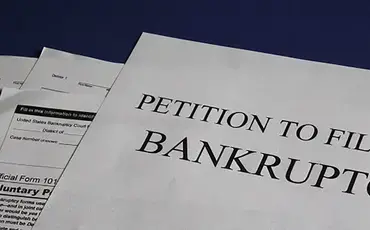
Corporate and personal insolvency
Whether you are facing a business or personal insolvency, reaching an effective solution is best achieved with the help of a specialist solicitor. We understand how stressful being in financial trouble can be, which is why our dedicated team, which is backed by Legal 500 recognition, provides straight-talking, pragmatic advice to support you through this difficult time.
Contact us today to find out how we can help you.
Corporate insolvency
In the current volatile economic climate, it’s more important than ever for businesses to effectively manage their finances and take prompt action if things take a downturn. Our business insolvency team helps companies to avoid insolvency as well as provide swift, practical advice when the procedure is unavoidable. We have experience and expertise in helping businesses to understand the various options available to them and advise on the best course of action, including:
- Administration - to seek to rescue the company or obtain a better outcome for creditors, including restructuring
- Advising directors of the company of any personal implications for their company becoming insolvent, including where personal guarantees have been entered into
- Company Voluntary Arrangement - helping your company and its creditors to reach an agreement
- Liquidation - from realising and distributing assets to creditors, right through to the final stages of winding up
Personal insolvency
Having helped many individuals navigate complex insolvency issue, we have gained extensive experience and expertise to help you do the same. If you happen to be facing financial difficulty, we understand the strains it can cause on all other areas of your life, including family and relationships.
For this reason, seeking legal advice as soon as possible can lessen the impact of the financial burden and help you to get back on your feet. We can advise and support you through all areas of personal insolvency, including:
- Negotiating and reaching agreements with creditors regarding a repayment plan - both informally or through a formal individual voluntary arrangement
- Bankruptcy - from initial explanations of the procedure right through to realising and distributing assets and advising non-bankrupt spouses on any implications
- Advising on the implications of non-payment
Insolvency practitioners
We also regularly act for insolvency practitioners, providing them with legal guidance on carrying out both business and personal insolvencies. Whether they are working for debtors or creditors, we are trusted legal partners to many practitioners who value our straight-talking, practical advice. Our team has experience in advising insolvency practitioners on all aspects of the insolvency procedure, including debt collection, antecedent transactions, claims against shareholders, landlord and tenant issues and employment rights.
Insolvency advice for creditors
Where companies or individuals are owed money from a customer or another individual who is in financial difficulty, we can help you to recover your debts.
For companies, we can advise on the validity of retention of title clauses, recovering goods already delivered and issue winding up petitions for non-disputed debts. As well as this, we offer our commercial clients a bespoke, digital debt recovery service.
For individuals, we can advise on and assist you with issuing or defending statutory demands or bankruptcy petitions.
Don’t just take our word for it…
Our highly-experienced department has Legal 500 recognition, which states:
Based in Derby, Smith Partnership‘s client roster primarily consists of insolvency practitioners, creditors, shareholders and directors. Held in high esteem by clients for her ’incredibly pragmatic’ advice, Ruth Ball specialises in contentious insolvency matters. With a focus on clients within the retail and construction industries, Ball is predominantly instructed by administrators and directors.
'The team have very strong technical and commercial skills. This is the team to use in insolvency disputes.’
Why choose Smith Partnership?
Our team has years of experience in providing personal and business insolvency advice to individuals and businesses of all kinds, and in a range of different circumstances. We are able to draw from this experience to tailor bespoke solutions for your unique situation, ensuring you or your business reach the best possible outcome.
As a firm, we pride ourselves in providing a straightforward approach, ensuring that any advice or communications you receive from us will always be straight-talking and jargon-free. You can enjoy peace of mind knowing where you stand and your available options at every stage of the process.
Smith Partnership has offices in Derby, Burton Upon Trent, Leicester, Swadlincote and Stoke-on-Trent so you are never too far away from expert legal advice when you need it. As well as accessibility, we offer an approachable and responsive service whereby our dedicated solicitors are alway on hand to help.
It is important that you deal with the statutory demand quickly to prevent a bankruptcy petition being issued against you. If the money is due, you will need to make payment. If you are unable to make payment, you may wish to contact the creditor and agree a repayment plan or look at other options such as an individual voluntary arrangement. If the debt is disputed, you will need to make an application to the court asking for the statutory demand to be set aside (if this cannot be agreed with the creditor). You have a limited amount of time to deal with a statutory demand and, therefore, if you require any assistance in dealing with the statutory demand, you need to obtain legal advice quickly.
There are certain restrictions on trading under a similar name when a company is placed into liquidation, therefore, you should always obtain legal advice before setting up a new company or trading. If you breach any of the restrictions, it is a criminal offence and you may be liable to a fine, imprisonment and/or both.
There are different ways in which to place a company into an insolvency process and the cost will depend on the steps taken. We can provide advice on the different forms of insolvency and likely costs involved.
If a company goes into liquidation, it is likely that the business will be closed and any employees will be made redundant. If a company goes into administration, the administrator may ask some employees to continue to work although, in most circumstances, there will be redundancies. In some cases, if the Company’s business is sold after the administration, the employees may be transferred to the new company.
If an employee is owed wages, they may be able to make a claim with the insolvency practitioner appointed or through the Redundancy Payments Office.
As soon as you become aware that it is probable that the company will become unable to pay its debts as and when they fall due, the directors should seek urgent professional advice from a solicitor or an accountant as to the options available to ensure that the directors comply with their statutory duties. In some cases, if advice is sought immediately, the business can be saved.
If you believe that you may be unable to pay your debts as and when they fall due, you should seek professional advice from your solicitor or the Citizen’s Advice Bureau as to the options available to you.
Administration is a formal insolvency procedure whereby an administrator is appointed by either the court, the directors of the company or a floating charge holder. The purpose of the administration is to either attempt a reorganisation of the business or to take steps to sell the company’s assets under the protection of a moratorium. Creditors cannot take steps against the company whilst it is in administration but they may be able to recover goods under a retention of title clause.























